Dr. Oliver Sacks was a neurologist who managed to do what no one else had done before. Through his work, dedication and empathy he made a great impact on his patients’ lives. He gave them their lives back, at least for a moment, which is more than anyone else had been able to do, although he didn’t find a cure. His patients were terribly disabled, neglected and forgotten but he made them immortal.
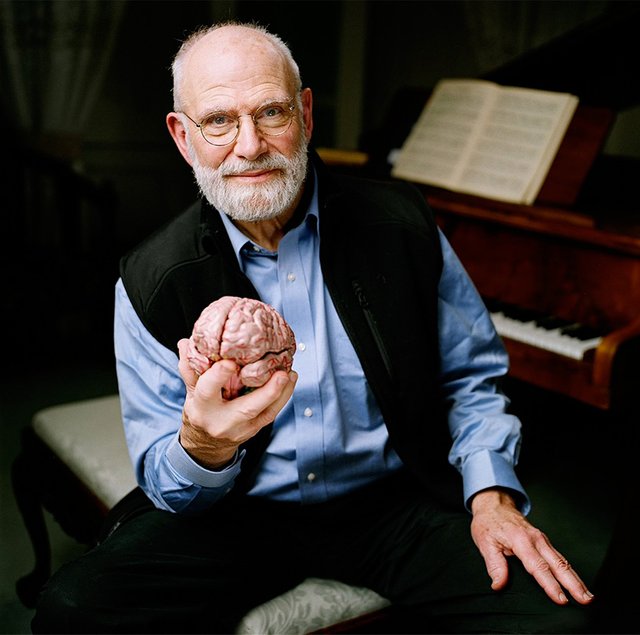
In 1966 as a 33 year old British doctor – neurologist he began working at Beth Abraham Hospital, “a home for the incurables”, chronic care facility in the Bronx, US. There he saw people in a condition that shocked him. They were catatonic, motionless, locked in grotesque postures, trance-like as if they had been statues made of stone yet giving signs of life. They were in a near-comatose state, but conscious, without any appetite, affect or desire, indifferent to what was happening around them. Dr. Sacks learnt they were affected by encephalitis lethargica, the so-called “sleepy sickness”.
“Sleepy sickness” is a neurological disease, viral inflammation of the brain described in 1917 for the first time and, unfortunately, the cause haven’t been discovered yet. After the World War I (from 1917 – 1928) over 5 million people worldwide were suffering from it and the third of them died. They had muscular pains, tremors, body weakness and many of those who survived gradually fell and stayed in that catatonic - “statue” condition Dr. Sacks witnessed at Beth Abraham’s.
He was personally deeply affected by those people who became his patients. He was feeling heartbroken when realized they had no life, although appeared to be alive. They sat in their chairs motionless after being placed in them by someone else. Some of them didn’t speak, some of them were repeating meaningless phrases, some of them showed repetitive movements, but those were only the tiny signs of what a human being, even suffering from a disease, is capable of. He said “I am addicted to patients, I can’t do without them, I need to have the feeling of these other lives which become a part of my own. Empathy is not enough. I wish I could be in their shoes to know exactly what it’s like.”
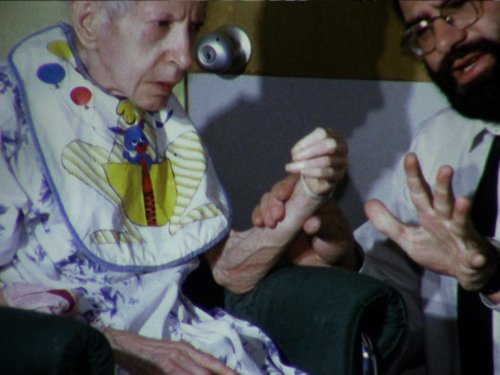
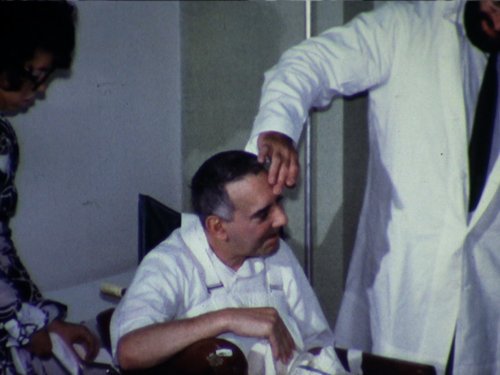
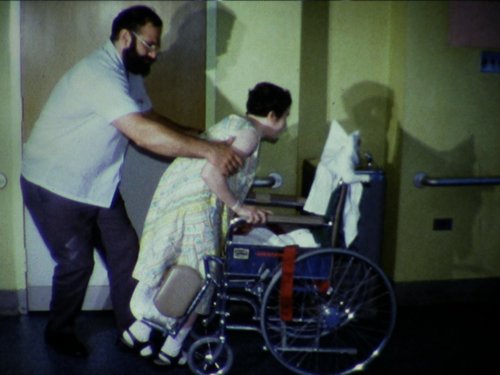
Over time he noticed that some of his patients would sneeze, began talking for about 30 seconds and then revert to the frozen condition again. For those 30 seconds he was able to see their full personality as if they had never been catatonic. Someone brought a dog to the hospital and the dog jumped in a motionless woman’s lap and out of the blue she shouted that she loved animals. She started stroking the dog and laughing. When the dog went away, she reverted to the stone-like rigid position showing no emotions at all. The most important observation by Dr. Sacks was made during the physical therapy. He was amazed that his patients were able to play the game of “catch” (the ball). That made him think, along with other signs he had already noticed, that there must be something more to it, there had to be something that could improve his patients’ health and quality of life.
Dr. Sacks noticed that the symptoms of the “sleepy sickness” were similar to those of Parkinson’s disease. So he began investigating and found out there was a new drug available that showed great improvement when it comes to people suffering from Parkinson’s disease. It was the drug called Levadopa, or L-dopa, considered to be the “miracle drug” at the time. He had the idea of using it in the treatment of his patients, but he hesitated for 2 years.
One of his patients was in a life-threatening condition because she hadn’t been able to swallow solid food and there was a fear of starvation. That was the moment Dr. Sacks decided to administer the L-dopa to his patients, although he didn’t have the full support because of his superiors’ doubt in the potential success.
He divided the patients into two groups, placebo and treatment group and he realized that the patients which were given the drug responded positively in less than a week so he decided to give the drug to all the patients.
And literally the miracle happened. The patients woke up from catatonia as if they had never been in that frozen condition before. Before the treatment they were statues, after giving the drug they got their personalities back. Being frozen for decades, they awakened. They began walking and talking. They laughed. In Dr. Oliver Sacks’ own words “The effects of this were incredible…they awakened. Their frozen faces melted, smiles appeared, eyes started to look around, get bright and twinkle, unused voices appeared, unused muscles started to work. Most certainly, a very festive feeling, perhaps a feeling of elation in the summer of ’69 and at that point one wondered whether, these patients wondered how many of them could have normal lives, go back into the world and sort of, be cured.”
But, the side-effects of L-dopa started to appear and a tolerance to the drug developed. So, he tried to adjust the dose by increasing it, but it didn’t help. Patients experienced strange ticks, psychotic behavior, paranoia, excessive libido and other unwanted symptoms, so the side-effects of the drug became worse than its benefits and the patients slowly reverted to the previous condition.
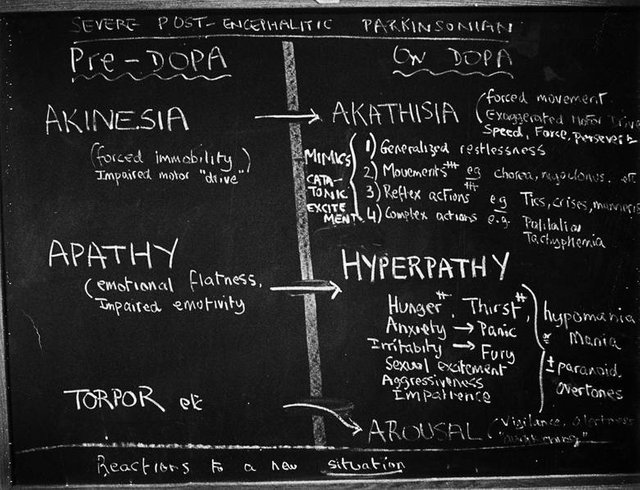
Dr. Sacks was feeling guilty wondering if he had done the right thing, did he make the right decision giving them the drug that gave them torment and false hope in the end. However, some of the patients decided to continue taking the drug, while some didn’t.
He wasn’t able to cure them, but he managed to give them a feeling of life and a part of himself. His hard work and personal relationships he built with his patients were priceless. They weren’t some living objects needed to be examined and treated as a part of his medical practice, they were people and friends for him. He was important to them just like they were important to him.
By writing the book “Awakenings” (1973) he made sure that the forgotten ones live forever.
- There is a movie called “Awakenings” (1990). The main actors are Robin Williams (as the doctor) and Robert De Niro (as the patient). The movie is definitely worth seeing because it depicts the real story very well, with minor differences.
- There are also numerous documentaries about the case, but the most relevant are those who contain Dr. Sacks’ original footage of his patients.
He was a person we need today, to not treat patients like numbers and letters on a paper, and giving them drugs to shut up. He rather gave them drugs to talk again. Wonderful article my friend and thank you for the movie recommendation. :)
Downvoting a post can decrease pending rewards and make it less visible. Common reasons:
Submit
Exactly! :)
Downvoting a post can decrease pending rewards and make it less visible. Common reasons:
Submit
Re-steemed by @serbia
Steemit Srbija Discord server:

Downvoting a post can decrease pending rewards and make it less visible. Common reasons:
Submit
Wow! that's an interesting article! I didn't know about this guy before, but his story is really inspiering! Thnx for sharing!
Downvoting a post can decrease pending rewards and make it less visible. Common reasons:
Submit
You are welcome! :)
Downvoting a post can decrease pending rewards and make it less visible. Common reasons:
Submit
Oh i loved this post. So much to learn on Steemit. I would suggest trying using steemstem tag as well. Gratz on the mini Curie.. Shows you create amazing content.
Downvoting a post can decrease pending rewards and make it less visible. Common reasons:
Submit
Thank you for reading the post! I'm glad you loved it, I tried hard to write it well :) Ok, I will use that tag as well, thank you for the information :)
Downvoting a post can decrease pending rewards and make it less visible. Common reasons:
Submit
Odlican tekst @mixology, i svo vreme dok sam citala cesem se po mozgu jer mi kao nesto poznato..I na kraju navedes ''Awakenings'' ..Kakav film! Hvala za prosirenje saznanja o ovom borcu za ljude.
Downvoting a post can decrease pending rewards and make it less visible. Common reasons:
Submit
Nema na cemu! :)
Downvoting a post can decrease pending rewards and make it less visible. Common reasons:
Submit
Another great story about the many great scientists from the Balkans. My collaborators in Slovenia and Croatia have given me a much greater appreciation for the region's history, culture, and intellectual contributions.
Downvoting a post can decrease pending rewards and make it less visible. Common reasons:
Submit